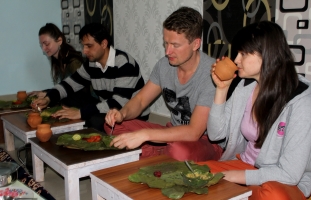 Ayurvedic eating etiquette is highly evolved. Knowing how to eat is as important as knowing what to eat and what not to eat. According to Charaka -an ancient Ayurvedic scholar, the following things should be considered while eating to nourish the body, mind, and soul.
Ayurvedic eating etiquette is highly evolved. Knowing how to eat is as important as knowing what to eat and what not to eat. According to Charaka -an ancient Ayurvedic scholar, the following things should be considered while eating to nourish the body, mind, and soul.
1. Warm (Ushnam) Food should always be warm. Warm food is always more tempting and draws all our senses to food. Warmth makes the food digestible by increasing the ‘agni‘ ( fire element ), and it also pacifies ‘Vata’ and ‘Kapha.’
2. Unctuous/greasy (Snigdham)
Anything that we eat should have some unctuous /greasy character. Unctuousness is an integral quality of the human body. It gives all the benefits of warmth along with the following:
- Nourishment of the body (anabolic effects)
- Nourishment of the sense organs
- Improvement in complexion
3. Quantity (Matra)
Food should be eaten in appropriate quantity. Heavy foods like cheese, black grams, meat, etc., should be consumed at half the satiation levels, while light foods like oats can be consumed three-fourths. Eating in the correct quantity promotes life span, keeps all doshas in balance, digests, absorbs, and assimilates well, and the waste product is quickly expelled.
4. Eat only after the previous meal is digested (Jeerne ashniyaat)
Food should only be consumed when:
- One is feeling hungry
- Burps are clean
- One is relieved of the urge to micturate and defecate
Food consumed in this manner will nourish all the ‘dhatus’ (tissues and fluids) and promote longevity.
5. No incompatible foods (Virya avirudha)
Incompatible foods should not be consumed together. E.g., fish and milk, yogurt and radish, etc. When consumed together, such foods will create an imbalance of doshas and block the microchannels.
6. Desirable ambiance (Isht deshe)
Eat in a calm and comfortable atmosphere, using proper cutlery. Traditionally gold, silver, copper, and iron (nowadays steel ) were used. The nobility used gold and silver. Steel and copper are much better options in today’s setting than plastic and silver foils. Eating in an undesirable ambiance will result in an anxious mind.
7. Neither too fast nor too slow (Na atidrut Na ativilambit)
If eaten too fast, food enters unwanted channels and does not stay in the stomach for proper digestion. Even the best foods do not give desired benefits when eaten too fast. If we eat too slowly, we don’t feel satiated and overeat. Moreover, the food gets cold and forms ‘ama’ (toxin).
8. Be mindful (Tanmana)
One should be focused and not talk or laugh while eating. The human mind is supposed to do one work at a time, but we have conditioned ourselves in a way that we are busy holding discussions, watching t v, reading, etc., while eating. One should use all five senses while eating to make it a blissful act rather than a routine affair. Enjoy the colors, taste, smell, texture of food, and mastication sound to increase the urge. All the etiquettes should be adopted in unison to make eating a blissful act.


